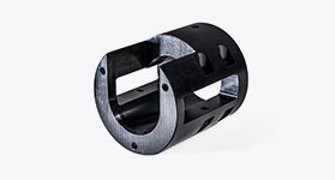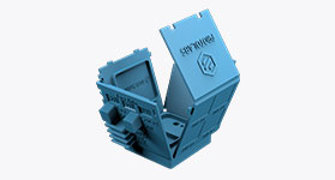Throughout history, major events have spurred change. Author Malcolm Gladwell refers to these events as “tipping points,” or the point where an idea, trend, or social behavior hits a threshold and catches fire for widespread adoption. Inflection points spur change due to industry disruption, like the transition from on-premises software to the cloud.
Industrial revolutions are the result of technology changes to spur the next phase of industry and manufacturing, which started with the first revolution, where steam and water power was adopted alongside mechanization, changing the face of manufacturing forever.
And now, we’re in the fourth revolution. Commonly referred to as Industry 4.0, this revolution emphasizes that the way we manufacture today will be forever impacted and changed because of the evolution of technology and the digitization of manufacturing.

In our world today, the global COVID-19 pandemic serves as a disruptive point in our world that has shaken cultural, societal, and business norms. It’s shown us the true impact of supply chain disruption and the importance of contingency planning. Before anything else, it has shown us that the acceleration of the fourth industrial revolution is more needed than ever as the industry is ready for another metamorphosis into what will drive the next manufacturing generation forward.
The Role of Digital Manufacturing
Over the past several decades, technology has transformed how we do business—and the industrial world has been slow to catch up. However, in recent years, it’s become more apparent that manufacturers are adopting technologies—including artificial intelligence, internet of things (IoT), and predictive analytics—to drive success in their businesses and supply chains.
What we’ve learned from traditional manufacturing over the past century is that external threats, such as market demand, and internal challenges, like workforce retention, significantly impacts gross margin and thus, profitability. Digital manufacturing focuses on leveraging technology to minimize the impact of external and internal factors while creating a manufacturing process that helps deliver that profitability.
As one of the leading digital manufacturers in the world, Protolabs boasts a digital thread that connects the manufacturing process from the moment that a CAD file is uploaded into the system for quoting. Because of the gains offered with tight technology integration on the plant floor, Protolabs can deliver parts in as fast as one day—no matter what market factors may be present.
Digital manufacturing will continue to accelerate as the world and technology evolves. The current global pandemic, for instance, highlights weaknesses within today’s global supply chain that can be mitigated with a digital manufacturing partner that can respond quickly without compromising quality or reliability along the way.

What Digital Manufacturing Means for Supply Chain Flexibility
In the past 12 months, U.S. companies have come up against some of the toughest supply chain challenges—from trade wars to natural disasters and now a global pandemic. Macro conditions have never created as much complexity for companies as they have now. The issues have revealed one important component about today’s supply chains: They cannot survive without flexibility.
The acceleration of Industry 4.0 emphasizes how digital manufacturing will become a thread for manufacturers in today’s world. Just like previous industrial revolutions, Industry 4.0 will cause short-term pains for manufacturers in order to drive long-term benefits for the industry and companies around the world.
How does this support supply chain flexibility? Taking what the industry has learned over the past several months—from the desire to move production back to the U.S. to a renewed focus on contingency planning—leaders understand that rigid supply chain plans may look good on paper, but fail to execute in practice as market conditions are ever-changing and require adaptability in order to succeed.
Will Digital Manufacturing Result in Onshoring Production?
More than three decades ago, China underwent an industrial revolution that positioned it as the top exporter for manufacturing goods due to incomparable infrastructure and supply chain management comparative to other manufacturing powerhouses.
Since then, tariff wars and global issues like the COVID-19 pandemic, combined with advances in digital manufacturing, have made onshoring production more appealing for many companies, particularly for injection molding.
Using on-demand injection molding for low-volume production can eliminate risk from supply chains by offering quality parts in as fast as one day—giving companies a second source to support line-down emergencies, demand volatility, or even product customization.
With the growing impact of macroeconomic conditions on manufacturing and supply chains, as well as the ability to onshore production while maintaining costs and quality while improving reliability, Industry 4.0 is poised to transform manufacturing. Industry 4.0 will help create a more sustainable and innovation model with U.S.-based digital manufacturers that understand how to support the desire for more flexible supply chain models that can quickly react and respond to disruption.
Interested in continuing the conversation about supply chain agility? Join us for our free webinar on Wednesday, June 24 at 1 p.m. CT as Bernadine Henderson, Protolabs’ director of procurement, discusses the benefits of a flexible inventory model.

Lora Osborn is the marketing manager for injection molding at Protolabs, where she focuses on helping customers understand the value of digital manufacturing for injection molding. She has worked in manufacturing, technology, and healthcare, focusing on how technology transforms industries, businesses, and the resulting services and products. Osborn holds a B.A. in strategic professional communications from the University of Minnesota. When she's not working, you will most likely find her somewhere outside, either fishing or trail running.





